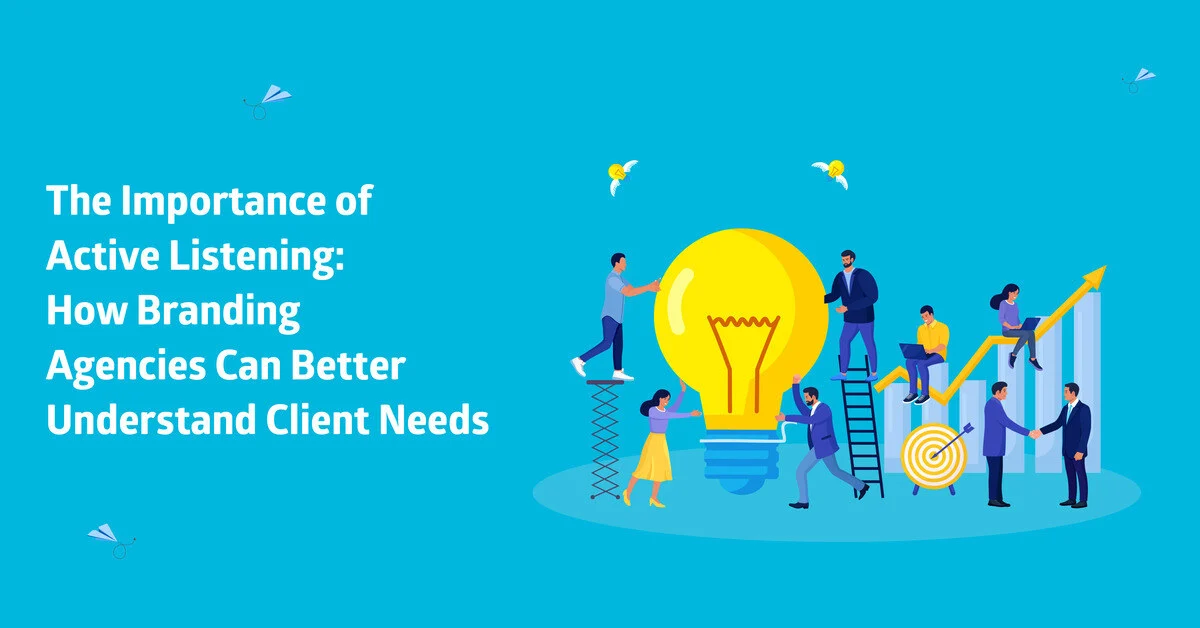
The Importance of Active Listening: How Branding Agencies Can Better Understand Client Needs
Clients could at times be precise, and at times, go on and on about their requirements. And in both these cases, it becomes crucial for you to comprehend and interpret the information that is being conveyed. If you wish to be one of the top advertising agencies in Pune, your employees must possess this invaluable skill of active listening. Because it is this skill that could be the difference between creating a campaign that resonates deeply and one that misses the mark. This blog explores the importance of active listening and how a branding agency in Pune can leverage it to better understand and meet client needs.
What is Active Listening?
Active listening is the process of fully concentrating on what is being said rather than just passively hearing the message of the speaker. It involves listening with all senses and giving full attention to the speaker. Active listeners show that they are paying attention through body language, verbal acknowledgments, and thoughtful responses. This approach ensures that the listener truly understands the speaker’s message, intentions, and emotions.
Now, Let’s Explore The Role of Active Listening in Branding
1. Building Strong Client Relationships
The foundation of any successful branding campaign is a strong relationship between the agency and the client. When you are being an active listener, you are also building trust and respect with your clients. This in turn results in a strong relationship. When clients feel heard and understood, they are more likely to share their true thoughts and concerns, leading to a more collaborative and productive partnership.
2. Accurate Understanding of Client’s Vision
Clients come to branding agencies with a vision for their brand. However, articulating this vision can sometimes be challenging. Active listening allows branding professionals to pick up on subtle cues and nuances that might otherwise be missed. By asking clarifying questions and providing feedback, agencies can ensure they have an accurate understanding of the client’s goals and aspirations.
3. Effective Problem Solving
Every brand faces unique challenges. Active listening helps agencies to identify these challenges more effectively. By understanding the underlying issues and the client’s perspective, branding agencies can devise more targeted and effective solutions. This not only enhances the quality of the branding strategy but also increases client satisfaction.
4. Enhancing Creativity
When branding agencies actively listen to their clients, they gain valuable insights that can spark innovative ideas. This deeper understanding can lead to more creative and effective branding solutions that resonate with the target audience.
5. Minimising Miscommunication
Miscommunication could waste a lot of time, resources, and might also result in potential conflicts. Active listening minimises the risk of misunderstandings by ensuring that all parties are on the same page. By repeating back what the client has said and seeking confirmation, branding agencies can ensure they have correctly interpreted the client’s needs and expectations.
How to crack the code for active listening? Don’t worry, it is not rocket science. Here are a few really simple tricks you could use to enhance your listening skills.
1. Show Genuine Interest
Showing genuine interest in what the client is saying can make a significant difference. This involves maintaining eye contact, nodding in agreement, and using verbal affirmations like “I see” or “That’s interesting.” These small gestures demonstrate that the listener values the client’s input and is fully engaged in the conversation.
2. Avoid Interrupting
Interruptions can disrupt the flow of conversation and make the client feel undervalued. It’s essential to let the client finish their thoughts before responding. This not only shows respect but also ensures that the listener captures the complete message.
3. Ask Open-Ended Questions
Open-ended questions encourage clients to elaborate on their thoughts and provide more detailed information. Questions like “Can you tell me more about that?” or “How do you envision this project?” invite clients to share their vision more fully, offering deeper insights for the agency.
4. Paraphrase and Summarise
Paraphrasing and summarising what the client has said helps to confirm understanding and shows that the listener has been paying attention. For example, saying “So, what I’m hearing is that you want to focus on the IT employees in this micromarket,” can clarify any potential misunderstandings.
5. Reflect Emotions
Reflecting the client’s emotions demonstrates empathy and helps to build a stronger connection. Phrases like “It sounds like we have a really strong product here,” can validate the client’s feelings and open the doors to a more engaging dialogue.
The top advertising agencies in Pune understand the importance of active listening, and motivate their employees to enhance this skill through training programs and workshops. One such advertising and branding agency in Pune is Seagull Advertising. Known for its effective branding strategies and a fun-filled advertising agency culture, Seagull Advertising has helped over 100 brands soar high.


